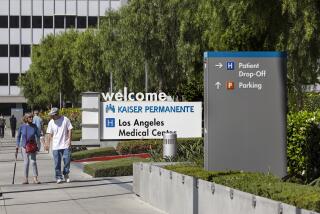4 more California transplant programs under scrutiny
The woes of the state’s transplant centers continue to mount, as a national regulator has found problems in four more programs, confidential records show.
Scrutiny of these programs — some of which face sanctions — follows the public discipline of three other California centers earlier this year by the United Network for Organ Sharing.
All told, more than a quarter of the state’s 25 transplant centers have either been sanctioned or placed under scrutiny this year.
The state remains the only one in the nation to have had centers publicly disciplined by UNOS, a federal contractor that traditionally attempts to bring programs into compliance through private negotiations.
The latest hospitals accused of violating UNOS policies are Kaiser Permanente in San Francisco, UC San Diego Medical Center, USC University Hospital and UCLA Medical Center.
The violations, detailed in a confidential report of UNOS’ disciplinary committee, range from problems directly affecting patient care to inconsistencies in record-keeping. The document, prepared for the group’s board of directors, was reviewed by The Times.
Dr. Timothy Pruett, UNOS’ president-elect and head of its disciplinary panel, said he could not discuss specifics of the cases but called the glut of California inquiries “very peculiar.” He added that he hadn’t found a common thread in them.
“On the flip side, there’s an awful lot of issues that we’ve addressed that have come from California,” Pruett said, adding that he wished that weren’t the case.
The Times reported last month that UNOS often fails to detect or decisively fix problems at the centers it oversees. When it does act, it routinely keeps its findings secret, leaving patients and their families unaware of the potential risks, the paper found. The group has taken steps to become more aggressive, but officials say UNOS works best when it can help centers improve instead of reprimanding them in public.
UNOS currently is considering imposing its most serious sanction against Kaiser for endangering patients when it forced them in 2004 to transfer to its fledgling kidney program from established transplant centers at outside hospitals, the document shows. The proposed action, revoking the center’s “good standing,” has little practical effect but is a potentially embarrassing blow to any hospital’s reputation.
Hundreds of patients were stuck in limbo for months — with little hope of receiving new kidneys — because Kaiser failed to properly handle paperwork transferring them to its new center in San Francisco. The program announced in May that it would shut down, after a series of articles in The Times detailing its problems.
UNOS had not known about the program’s failings beforehand.
Mary Ann Thode, president of Kaiser Foundation Health Plan and Hospitals in Northern California, said confidentiality rules prohibit her from discussing UNOS’ recommendation. She said the kidney program will be fully closed by year’s end, with patients transferred back to other centers.
UNOS’ disciplinary panel also has recommended placing UC San Diego on probation for a series of clinical and administrative errors identified during a January inspection.
On five occasions, hospital staffers had entered the wrong blood type for liver transplant patients in the UNOS computer system, which helps match donors and recipients. If an organ does not match a patient’s blood type, the body can reject it.
UNOS also found instances in which the data entered into its computer system by UC San Diego did not match the patients’ medical records, suggesting that transplant candidates’ conditions might not have been accurately represented. The severity of a patient’s condition affects his or her prospects for a liver transplant, with the sickest given priority.
UC San Diego officials said none of the deficiencies caused harm to patients or unfairly moved them higher on the regional waiting list for an organ. The officials said they have retrained staff and hired a new transplant administrator. UNOS accepted the center’s corrective plan and is holding off on imposing probation pending further review.
Dr. Angela Scioscia, the hospital’s chief medical officer, said she was glad UNOS identified the problems. The group’s policies, she said, “add layers of safety and support” for patients.
UNOS is considering issuing a letter of warning to USC University Hospital after finding problems with its heart, liver and lung programs during a routine inspection in November 2005.
In particular, reviewers noted instances in which patients at the center received priority for heart and liver transplants even though they did not meet technical UNOS criteria. It also found cases in which laboratory data and other information entered into the UNOS computer by USC staffers did not match patient records, the confidential document shows.
Hospital officials would not discuss the findings, saying only that they had requested a meeting with UNOS and that it had not yet occurred.
The UNOS review does not refer to excessive deaths within USC’s liver program, previously reported by The Times. For patients receiving new livers from January 2003 to June 2005, 75.8% lived for at least a year after their transplants — far below the U.S. average of 86.6%. USC’s survival rate is among the country’s worst.
UNOS also spotted deficiencies in UCLA’s liver program, the nation’s third-largest, during a routine review in October 2005. Lab slips could not be found verifying patient information entered into UNOS’ computer system.
Dr. J. Thomas Rosenthal, chief medical officer at UCLA, said he subsequently confirmed that the data were correct. UNOS had considered a letter of warning but decided against it, he said.
“The errors that were found, we viewed as relatively insignificant and had no impact whatsoever on patient safety,” he said.
Previously this year, UNOS took action against three California centers.
In March, the group revoked the good standing of St. Vincent Medical Center in Los Angeles. The hospital conceded that its doctors had improperly arranged for a liver transplant for a Saudi national, bypassing 50 people on a regional waiting list whose conditions were more dire.
Hospital staff then falsified records to hide the arrangement. The program closed last fall.
The same month, UNOS placed UCI Medical Center in Orange on probation after a scandal that closed its liver program in November 2005.
UCI closed the program after The Times reported that it did not have a full-time surgeon for more than a year.
At least 32 patients died awaiting operations in 2004 and 2005, when the hospital turned down scores of organs that could have saved some of them.
And in September, UNOS placed Sharp Memorial Hospital in San Diego on probation for deficiencies in its pancreas transplant program.
The group found that Sharp had not performed a pancreas transplant for more than a year, even as it added patients to its waiting list.
*
tracy.weber@latimes.com
charles.ornstein@latimes.com
More to Read
Start your day right
Sign up for Essential California for news, features and recommendations from the L.A. Times and beyond in your inbox six days a week.
You may occasionally receive promotional content from the Los Angeles Times.






